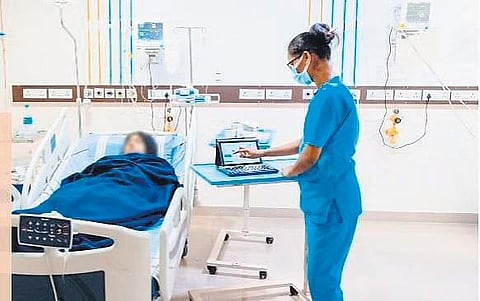Bengaluru's Cloudphysician Healthcare: Leveraging tech in healthcare
At 5 pm on a sweltering June evening, anaesthetist Dr Dilip Singh Parmar who works at the Aastha hospital in Nadiad, a town 60 km from Ahmedabad, received a trauma case, which demanded immediate critical care. The 38-year-old patient had met with a serious road traffic accident on the highway. He was declared braindead after a few hours. Parmar promptly reached out to the local organ donation network hoping to ensure that the patient's organs could be harvested to give a fresh lease of life to three needy patients.
The cutting-edge technology of the smart ICU kit at Aastha came to the rescue. It relayed vital patient data to organ specialists across the country. For the next 24 hours, they kept a minute-by-minute watch on the accident victim, prescribing suitable treatment protocols and guiding local doctors to ensure that his vital organs were in optimal health. The next morning, specialist teams from Ahmedabad reached Nadiad to take away his heart, kidney and liver which they transplanted successfully in the bodies of the waiting patients within the next 24 hours.
This kind of fast-tracked organ retrieval and transplant protocol was possible despite of specialists not being available around the patient because Parmar leveraged the expertise of specialists in other parts of the country through Cloudphysician, a meditech company that brings together healthcare and technology. “Without technology, this episode would have been a logistic nightmare costing time, money and energy,” says Dr Dileep Raman, MD, Co-founder of Benguluru-based Cloudphysician Healthcare.
The platform provides ICU services to hospitals lacking such facilities. The company has pioneered the ICU-in-a-box concept called Smart ICU— a box packed with high-end cameras (with 25 times better resolution than the latest iPhone camera), EMR (Electronic Medical Records) wires, Android and iOS servers compatible with mobile cameras, laptops and digital screens. The healthcare company has tie-ups with various hospitals countrywide which may request experts to be sent to set up the machines and give two weeks of training to local doctors. After the networks are connected through a software-defined network, the local doctors are familiarised with the workflow procedures. The platform provides notifications, secure chats, video conferencing, and a high-definition video feed for the doctors 24x7. Smart ICU also eliminates documentation workload that typically slows down hospital staff.
As of 2022, there are only about 5,000 ICU super-specialists across India for over three lakh ICU beds. “Smart ICU bridges this gap by using advanced technology to reach out to critical care patients in real-time. An ICU specialist sitting in Bengaluru can treat a patient in Karnal in Haryana,” Dileep reveals.
Using cameras that rotate 360 degrees, a Cloudphysician doctor can see the colour of a patient's pupil and the texture of tongue thousands of kilometers away. The technology works on broadband and 4G networks. Cloudphysician were called in to man the ICU ward of a Assam hospital during the floods a month ago. The co-founder says the company's doctors had done extensive work in Leh, Karnataka and Maharashtra during the pandemic.
It’s surprising how artificial intelligence, cloud computing, data science join with human expertise to save lives, he says. Cloudphysician was started by Dileep and his colleague Dr Dhruv Joshi, an Internal Medicine, Pulmonary and Critical Care Specialist. They met while doing their pulmonary and critical care fellowship at the Cleveland Clinic, USA. They came back to India in 2014 to start Cloudphysician in 2017.
Today, Cloudphysician has 25 ICU specialists, 60 ICU nurses and 200 tech staff. Dileep says that leveraging technology helps patients in remote areas and small towns since it is difficult to travel to metros and spend Rs 80,000 a day for intensive care. They can get the same treatment from the same doctors for one-fourth the cost, he adds. In the last five years, Cloudphysician has touched 45,000 ICU patients. “When man, machine and medicine come together, it's a miracle,” he concludes.

